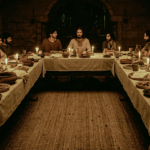Warning: This article contains spoilers for the television show The Walking Dead.
The Walking Dead is an American television show based on a comic book series of the same name. Highly rated, with many awards nominated and won, the show ran for eleven seasons and spawned several spin-off series.
It focuses on an ever-changing group of survivors as they navigate a worldwide zombie apocalypse, the cause of which is never explained, and a cure never seriously explored. Only two individuals stay throughout the entire series, as various characters inevitably die by either human or zombie hands. The zombies, known as “walkers” in the show, can turn humans by biting or scratching them. All humans, however, carry the zombie pathogen, so all will reanimate once they die. Walkers can only be killed by damaging the brain or destruction of the entire body.
What is fascinating about this show, is that it is not about zombies. It is about humanity. It is about what happens to that humanity when faced with dire and dangerous circumstances. It is about how that humanity can be so easily lost when despair, evil, exploitation, or hopelessness overwhelms individuals and groups.
The main story arc revolves around Sheriff Deputy Rick Grimes, his wife Lori, and son Carl as they are reunited, and share life together with a group of other survivors collected on their journey to stay alive and safe. During their travels they encounter other groups of survivors, some who help them, while others try to destroy the group or take all their resources.
So often, fiction shows like The Walking Dead, offer a critique of the world, more thought-provoking than a documentary. Many of the enemies they come across are almost too fantastical, too extreme to be taken seriously. The scariest situation they find themselves in is the one that is closest to our current reality. The “Commonwealth” tries to keep the old world alive with the rich and powerful dominating the politics and the safety of its residents, using money to keep people in bondage and poverty, and dolling out extreme punishments to those who question or disobey. Injustice and the abuse of power are well entrenched allowing the rich to do whatever they want.
Over the course of the series, two big themes emerge – family and hope.
Family is not necessarily biological. “Found family” is just as important and often shares tighter bonds than blood relatives. The found family may change over time, but its commitment to care and protect its members is paramount. By the end of the series, only Lori’s daughter is still alive and with the group. In fact, not one main child character still has their biological parents when the show wraps up. Yet, they are still loved and provided for by the group.
The early Christian Church found itself carrying some similar attitudes. At the end of Acts 2, there is one paragraph that describes a found family. The believers shared all their possessions. Some would sell land and goods to ensure provision for the whole group. They lived and ate together, in the midst of sharing their Christian faith with others.
In addition, there was a shift in attitude. Biological children were no longer the means to eternal life, or some form of inheritance. They were not to add to their numbers simply by childbirth. Rather, bringing new believers into the fellowship was the way that they would grow. It was a stark and counter cultural way of living.
The second theme of hope is seen in The Walking Dead in a variety of ways. Fighting various enemies when grossly outnumbered; entering into alliances with other groups for mutual support and protection; bearing children despite the dangers and the cost; the never-ending quest for something better than what they currently experience. The practice of hope may well be hard, when faced with a zombie apocalypse and the decline of the human race, but it continues to emerge.
For Paul, hope was a far more tangible thing. Throughout Acts 23-28, as he is moving from one court to another, from Judea and Jerusalem to Rome, he is defending the hope he has in Jesus Christ, the resurrection, and the promises of God. What the apostles had witnessed, and what he had experienced on the road to Damascus, demonstrated a sure hope that what God had promised in the Hebrew scriptures was fulfilled in Christ and now included Gentiles as well as Jews. He writes about it in depth in Romans 8 – that there is no condemnation for believers, that the resurrection was real, that Christians were the adopted children of God, and that the whole of creation would be liberated from its decay. This was a sure hope, not wishful thinking.
While hope and family might look attractive in The Walking Dead, they pale in comparison to what is offered in the united body of Christ and the sure hope we share in Jesus’ resurrection.
The Walking Dead is streaming now on Stan, and is available on Blu Ray and DVD.
Dr Katherine Grocott













